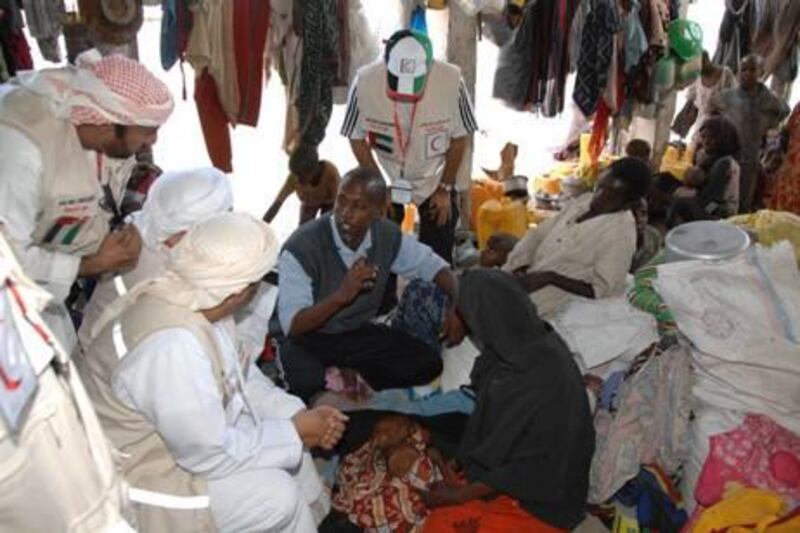DUBAI // A second UAE humanitarian aid team will fly to the Horn of Africa tomorrow with immediate help for 20,000 families facing starvation in the worst drought in 60 years.
Officials from the Mohammed bin Rashid Al Maktoum Humanitarian and Charity Establishment will distribute 900 tonnes of food and dig more than 60 water wells in Somalia, in coordination with the Red Crescent Authority and other UAE aid agencies.
Picture gallery: UN allowed to intervene in Somalia famine
The UN will airlift emergency rations this week to parts of drought-ravaged Somalia that militants banned it from more than two years ago - a crisis intervention to keep hungry refugees from dying along what an official calls the "roads of death."
The aid team is the second to leave in less than a week, after directives by the President, Sheikh Khalifa, to provide emergency relief to the region.
"The organisation has collected a lot of information on the drought and decided to create a team … to travel soon to areas in Somalia," said Ibrahim Bumelha, the establishment's vice president.
Each family in distress will be given a month's supply of food: 25 kilograms of rice, 10kg of wheat, 5kg of sugar, corn, cooking oil and juice.
The supplies will be bought in Ethiopia and transported to the capital, Addis Ababa, ready for distribution in Somalia from Thursday.
The organisation also plans to start work immediately on digging both surface and deep-water wells, at a cost of Dh2 million. The relief work will be carried out in collaboration with UAE and Somalian agencies, and the UAE embassy in Ethiopia.
The charity also announced a fund-raising campaign for Ramadan, a day after the United Nations appealed for another US$1.4 billion (Dh5.1bn) to provide life-saving assistance to more than 12 million people. Officials encouraged both UAE nationals and expatriates to donate generously.
"We urge all parties and financial organisations, businessmen, nationals and residents to donate to this campaign, even if it is a small amount," said Mr Bumelha, who is also the humanitarian adviser to Sheikh Mohammed bin Rashid, Vice President of the UAE and Ruler of Dubai.
The organisation has already raised Dh10 million with the help of the charity organisation Dar Al Ber Society and Dubai Islamic Bank, but Mr Buhelma said more was needed.
Aid agencies said the UAE's relief team was acting quickly on the field to help famine-hit victims and displaced persons.
"They have started buying food and distributing it among needy people," said Mohammed Haji Al Khoori, director general of the Khalifa bin Zayed Al Nahyan Charity Foundation.
"We have sent through a cargo of over 20 tonnes of food. We are now waiting for a report from the teams." Officials from the foundation and the Red Crescent travelled together last Friday.
In the first phase of the programme, UAE teams are sending relief and food convoys every day to more than 55 camps housing more than 350,000 displaced people in Mogadishu, the state news agency Wam has reported.
In a new regional overview on Sunday, the UN's Office for the Coordination of Humanitarian Affairs cautioned that the famine was expected to worsen in the next two months. It said the crisis, which had already affected two regions of Somalia, could spread to the entire southern region of the country by September if other countries did not respond quickly.
"The food crisis is expected to peak in August and September," OCHA said.
Thousands of Somalis continue to flee across the border to Ethiopia and Kenya every day, driven out by the worst drought in 60 years, soaring food prices and a continuing civil war.
"Aid agencies have been denied access to the most affected areas. Women and children are forced to walk for weeks under gruelling conditions to reach safety, and are arriving in refugee camps in appalling health, overwhelming the already stretched capacity to respond," OCHA said.
The agency cautioned that drought conditions in Kenya's northern and north-eastern districts had deteriorated further in the absence of rain, after the poor performance of the March-June long rains.
aalhaddad@thenational.ae






